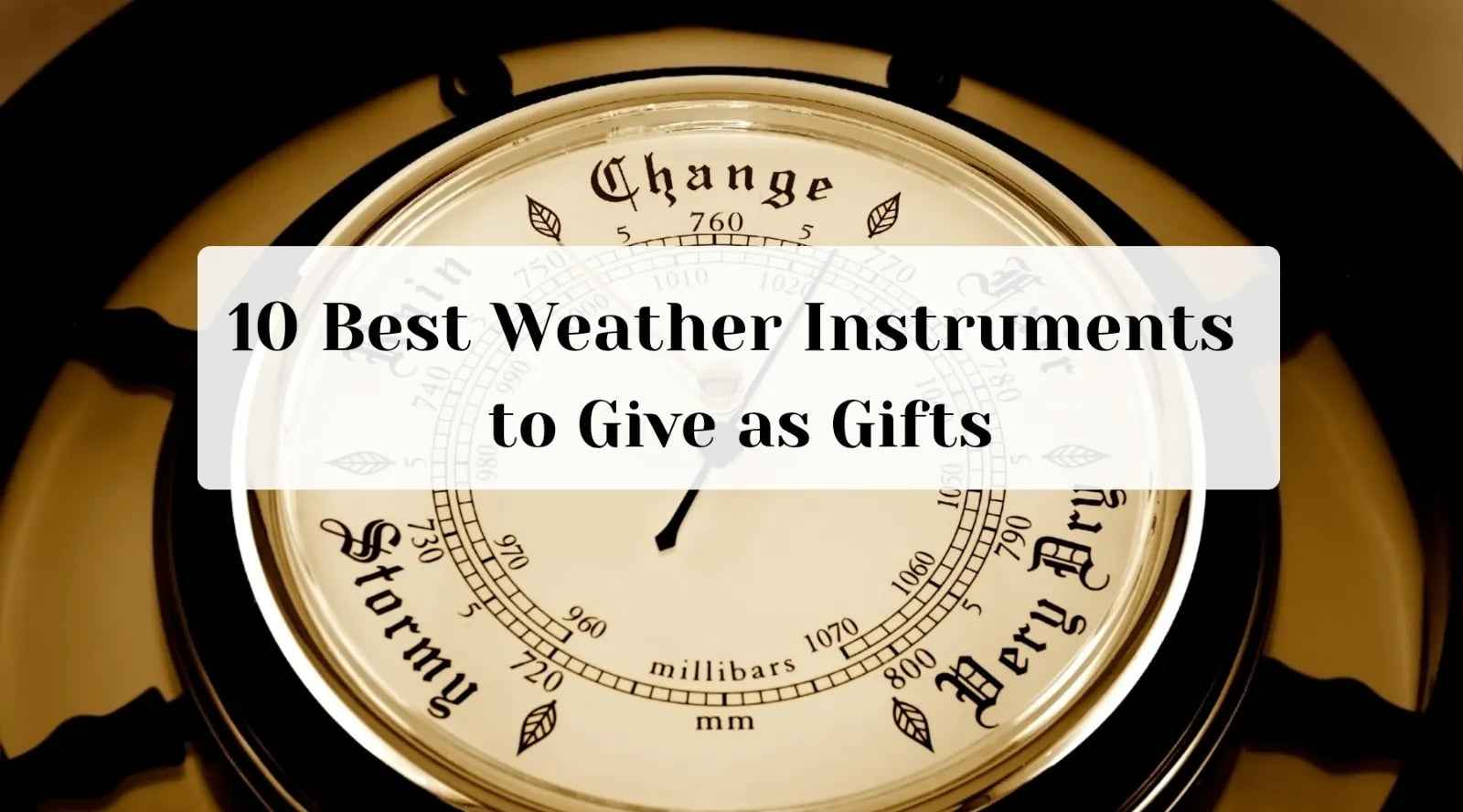(866)223-5699
(866)223-5699

Whether you're shopping for a nature enthusiast, a science buff, a gardener, or someone who simply loves to keep an eye on the skies, weather instruments make thoughtful and unique gifts. Here’s a roundup of the best weather-related tools to delight your friends and family—each with its own charm and functionality.
Weather instruments make especially thoughtful gifts for people who enjoy spending time outdoors or have a deep appreciation for nature. Gardeners, for example, can use rain gauges, hygrometers, and weather stations to monitor soil conditions and rainfall, helping them optimize their planting schedules and irrigation. Hikers, campers, and outdoor sports enthusiasts benefit from barometers and anemometers, which provide early warnings about changing weather conditions. Even casual observers of the sky will enjoy tracking the climate in their own backyard, deepening their connection to the natural world.
Tech-savvy individuals and science lovers also appreciate weather instruments for the data they provide and the insights they unlock. A home weather station that syncs with mobile apps can be endlessly fascinating for someone who loves statistics or DIY home automation. Kids and students benefit, too—weather instruments make excellent educational tools, sparking curiosity and hands-on learning. Whether it's used to stay safe, grow better plants, or simply understand the environment better, a weather-related gift is both practical and personal.
Best for: Weather enthusiasts, gardeners, tech-savvy people.
Home weather stations provide a full suite of weather data right from the backyard. They measure temperature, humidity, wind speed and direction, rainfall, and even barometric pressure. Many modern models also offer Wi-Fi connectivity and mobile apps for remote access.
Popular brands: Davis Instruments, AcuRite, La Crosse Technology.
Gift Tip: Look for models with wireless sensors and smartphone integration for extra convenience.

Best for: Aesthetic lovers, desk decor, science fans.
This classic thermometer uses floating glass bulbs to indicate temperature, based on Galileo’s principles of buoyancy and density. It’s both decorative and functional, making it a beautiful addition to any office or home.
Gift Tip: Choose a version with a wood or metal base for a polished, gift-worthy look.
Best for: Fishermen, sailors, hikers, or anyone interested in predicting weather changes.
Barometers measure atmospheric pressure and help forecast short-term weather shifts. Traditional analog barometers with brass or wood finishes offer a nautical or vintage style, while digital models provide precise, modern readings.
Gift Tip: Opt for a classic design for wall mounting or desk placement—it adds character to any space.
Best for: Indoor gardeners, wine collectors, or those who manage indoor climates.
These small, affordable instruments track indoor humidity and temperature—ideal for maintaining healthy air quality, plant growth, or preserving wine and cigars. They're also helpful in baby nurseries and greenhouses.
Gift Tip: Look for models with multiple sensor support and a clear digital display.

Best for: Gardeners, farmers, or weather hobbyists.
Rain gauges allow users to measure and track rainfall with ease. Manual models are straightforward and affordable, while smart rain gauges sync with apps and home weather systems for automated tracking and alerts.
Gift Tip: A wireless model with remote data viewing is a high-tech upgrade that adds real convenience.

Best for: Kite flyers, drone users, sailors, and storm watchers.
Handheld anemometers are compact tools for measuring wind speed, direction, and even temperature. They’re useful in outdoor hobbies and weather tracking alike, offering both fun and practicality.
Gift Tip: Digital models with Bluetooth or USB connectivity are especially popular for tech-minded users.

Best for: Gardeners, outdoor decor lovers.
Timeless and decorative, sundials and weather vanes make beautiful outdoor centerpieces. While they’re more ornamental than functional in the modern age, they still offer a nostalgic nod to traditional weather tracking.
Gift Tip: Choose designs made from cast iron or copper for lasting beauty and durability in any garden or yard.

Weather instruments are thoughtful and unique gifts that combine functionality, learning, and sometimes even decorative charm. They’re perfect for people who enjoy the outdoors, science, gardening, or simply staying informed about the weather.
Great recipients include gardeners, hikers, sailors, farmers, science enthusiasts, tech lovers, and even kids interested in learning about nature. They also make great gifts for homeowners and anyone who enjoys outdoor hobbies.
Most weather instruments are designed to be user-friendly. Digital models often come with easy-to-read displays and simple setup instructions. Analog instruments like rain gauges or thermometers require no technical skill at all.
A digital hygrometer or a basic home weather station is a great starting point. They're easy to use, offer useful information, and often include multiple sensors for indoor and outdoor monitoring.
Not all weather stations require Wi-Fi, but many modern models offer app integration for remote access and data logging. If the gift recipient enjoys smart technology, this feature is a great bonus.
Yes! Many instruments like thermometers, hygrometers, and barometers are perfect for indoor use. They can help monitor conditions in specific rooms, wine cellars, greenhouses, or even nurseries.
Absolutely. Simple tools like Galileo thermometers, rain gauges, and wind vanes can inspire curiosity in children and help them learn about basic scientific principles in a hands-on way.
Look for features like wireless sensors, accurate data reporting, durability, and compatibility with apps or smart home systems. Reputable brands include Davis Instruments, La Crosse Techonology, and AcuRite.
Yes! Instruments like Galileo thermometers, sundials, barometers, and weather vanes often double as elegant decor pieces. They’re functional and add a charming aesthetic to homes or gardens.
Prices vary widely—from under $20 for simple thermometers or hygrometers to over $300 for advanced wireless weather stations. There’s something for every budget and interest level.
From high-tech weather stations to timeless sundials, weather instruments combine function and charm in a way that few gifts can. Whether you're buying for a techie, a gardener, or a science enthusiast, there's a perfect weather-themed gift to brighten their day—and maybe even help them forecast the next one.
Leave a comment